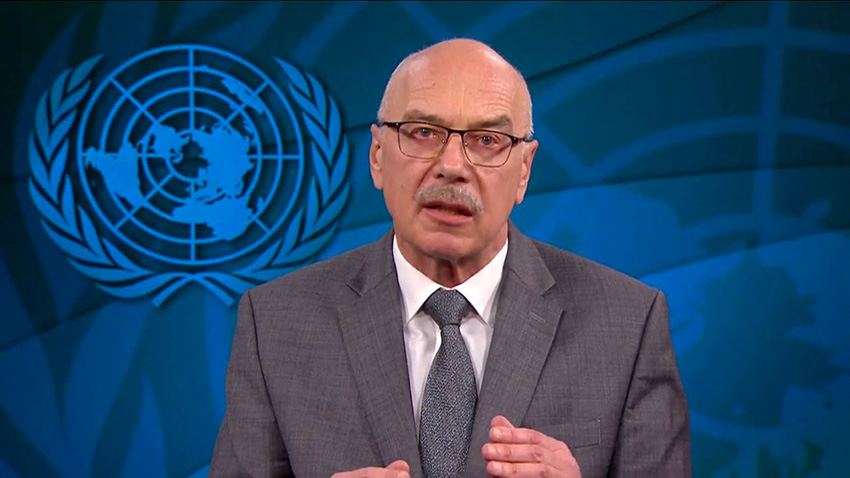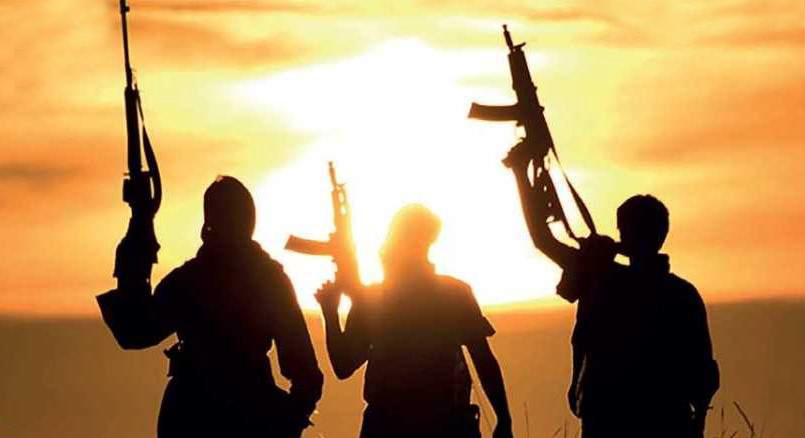Under-Secretary-General Voronkov briefing the UN Security Council.
International cooperation is vital to confront the multi-faceted challenges resulting from terrorism: Vladimir Voronkov
By R. Anil Kumar
-
Terrorism is the most direct asymmetric threat to the security of the citizens of any country and to international stability and prosperity
-
A persistent global issue that knows no border, nationality or religion, terrorism is a challenge that the international community must tackle together
-
UN will continue to fight this threat with determination and in full solidarity. The work on counter-terrorism focuses on improving awareness of the threat, developing capabilities to prepare and respond, and enhancing engagement with partner countries and other international actors
UNITED NATIONS, February 16. International cooperation is vital to confront the multi-faceted challenges resulting from terrorism, the head of the UN Office dedicated to confronting the scourge worldwide said, calling for decisive multilateral action.

“Force alone is not the answer,” Vladimir Voronkov, Under-Secretary-General for the Office of Counter-Terrorism, told ambassadors in the Security Council.
“Comprehensive responses, firmly grounded in political strategies, anchored in international law, and based on all-of-government and all-of-society approaches, are indispensable.”
Voronkov, underscored the critical role of international cooperation in tackling the multifaceted challenges posed by terrorism.
Addressing the Security Council meeting on counter-terrorism, he advocated for adopting the correct approach and a firm political will in the fight against terrorism.
“The broad scope of terrorist activities, their complex organizational networks, and the frequent movement of personnel, make it challenging for any single country to address and eliminate them independently,” Voronkov noted.
He called on the international community to combat all terrorist organizations and individuals designated by the Security Council by embracing a “shared, comprehensive, cooperative, and sustainable security concept,” support the UN in its pivotal coordinating role in global counter-terrorism efforts, and fully implement the relevant resolutions of the Security Council, the General Assembly, and the UN Global Counter-Terrorism Strategy.
Voronkov firmly rejected “any double standards,” opposed “selective counter-terrorism,” and condemned the politicization and instrumentalization of counter-terrorism issues.
He also emphasized the importance of focusing on key areas and further optimizing resource allocation.
“The international community must remain highly vigilant, unite to combat all terrorist forces.”
Moreover, Voronkov stressed the necessity of taking comprehensive measures to address the “root causes” of terrorism. “Security measures alone are insufficient to eradicate terrorism,” he said.
Voronkov highlighted the significance of resolving hotspot issues politically “to prevent terrorist groups from exploiting conflict situations,” promoting sustainable economic and social development to break the vicious cycle of “poverty breeding terrorism” and “terrorism leading to poverty,” and focusing on youth education and employment to deter young individuals from being swayed by terrorist organizations.
Referring to the Secretary-General’s report on the ongoing threat posed by Da’esh – also known as ISIL – Mr. Voronkov emphasized the group remains a menace, particularly in conflict zones, despite recent progress made.
Notably, there has been a substantial reduction in Da’esh’s operational capacities. The prolonged delay in announcing a new leader following the killing of his predecessor was indicative of internal challenges within the group, he said.
Furthermore, Member States’ efforts to counter terrorist financing have yielded tangible results, with Da’esh’s current financial reserves estimated between $10 million and $25 million, significantly less than previous years, Mr. Voronkov added.
He also highlighted important progress in countering Da’esh affiliates in Afghanistan, Indonesia, Malaysia, Egypt, and Mozambique.
Despite these achievements, the risk of Da’esh resurgence remains, as evidenced by increased attacks in Iraq and Syria since November, showcasing the group’s resilience, he continued.
Da’esh and affiliates remain a force in West Africa and the Sahel, with the vast region experiencing a deteriorating and increasingly complex security environment due to local disputes coupled with the agenda and operations of these extremist groups.
Need for prevention
In conclusion, Mr. Voronkov reiterated the UN’s commitment to counter-terrorism efforts, urging Member States to consider unintended consequences that result from some measures.

He also stressed the importance of grounding counter-terrorism efforts in international law, including human rights and humanitarian law, and cited the importance of prevention.
“Addressing the conflict itself remains our best hope to mitigate the threat posed by Da’esh and other terrorist groups,” he said.
From the beginning, the War on Terror has been both a battle of arms and a battle of ideas – a fight against the terrorists and their murderous ideology.
In the short run, the fight involves the application of all instruments of national power and influence to kill or capture the terrorists; deny them safehaven and control of any nation; prevent them from gaining access; render potential terrorist targets less attractive by strengthening security; and cut off their sources of funding and other resources they need to operate and survive.
In the long run, winning the War on Terror means winning the battle of ideas. Ideas can transform the embittered and disillusioned either into murderers willing to kill innocents, or into free peoples living harmoniously in a diverse society.
The battle of ideas helps to define the strategic intent of Strategy for Combating Terrorism.
The creation of a global environment inhospitable to violent extremists and all who support them, is crucial.





